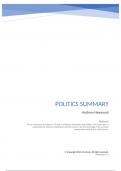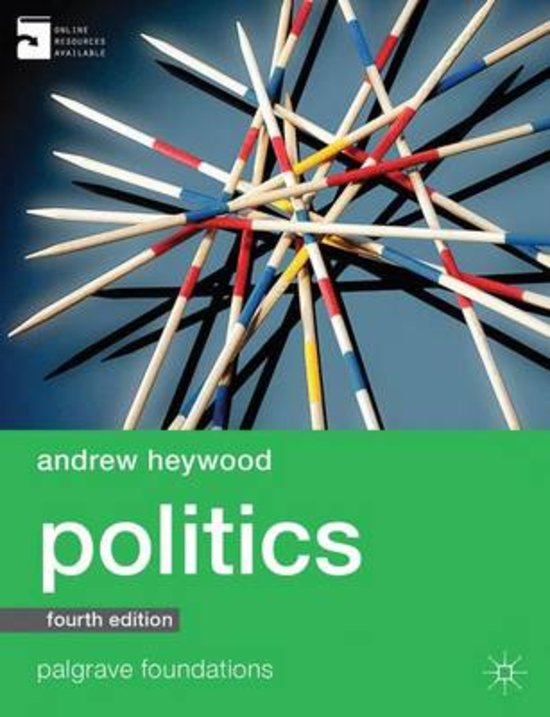POLITICS SUMMARY
Andrew Heywood
Abstract
This is a summary of Chapters 9, 18 and 19 of Andrew Heywood's book Politics. This is best used as
preparation for exams in combination with the lectures. Not all terminology in the summary
corresponds exactly to that of the lecture.
© Copyright 2023, Jim Roest. All rights reserved.
14983966@uva.nl
, Table of contents
Politi cs – Andrew Heywood
Chapter 9................................................................................................................................................2
Political culture...................................................................................................................................2
Approaches to political culture.......................................................................................................2
Political culture in crisis..................................................................................................................4
The media and politics........................................................................................................................5
Media theories...............................................................................................................................5
Impact of traditional media............................................................................................................7
Social media and politics................................................................................................................9
Post-truth politics.............................................................................................................................10
Politics and truth..........................................................................................................................10
The movement towards anti-intellectualism................................................................................10
Chapter 18............................................................................................................................................12
Security beyond borders...................................................................................................................12
Homeland Security...........................................................................................................................12
The police and politicians.............................................................................................................12
The military and domestic politics................................................................................................14
New security challenges...............................................................................................................14
Chapter 19............................................................................................................................................16
World order of the 21st century.......................................................................................................16
The 'new world order' and its fate................................................................................................16
The 'war on terror' and beyond....................................................................................................16
From unipolarity to multipolarity.................................................................................................17
Global governance............................................................................................................................17
Global economic governance.......................................................................................................18
The United Nations.......................................................................................................................19
1
, Chapter 9
Politi cal culture and the media
Political culture
To understand the meaning of stability and the survival of a regime, it is important to look at the
evolution of the concept of political culture. Influential political thinkers such as Burke, Marx, and
Herder emphasized the role of attitudes, values, and beliefs in politics. While these thinkers
recognized the importance of these factors, they did not explicitly frame them as part of a "political
culture."
In the fifties and sixties, there was a shift in political science towards the use of behavioral analysis
techniques, which led to a renewed interest in the concept of political culture. The central work in
this area was the book "The Civic Culture" (1963) by Almond and Verba, in which opinion polls were
used to study political attitudes and democracy in five different countries.
The resurgence of interest in political culture in the nineties was driven by attempts in Eastern Europe
to establish democracy after the collapse of communism, as well as by growing concerns in mature
democracies about the decline of social capital and the rise of culture wars. However, there is an
ongoing debate about whether political culture is influenced by the ideas and interests of elite
groups, which ties in with discussions about the role of the mass media and the manipulation of
political communication by the government.
Culture war: a political struggle over values and lifestyles that typically reflects the tension between
social conservatism (traditionalism) and social liberalism (progressivism).
Approaches to political culture
The citizen culture approach
Using their concept of political culture, with particular attention to the civic culture model, Almond
and Verba identified three types of political culture:
1. Political culture of participants: Citizens are actively involved in politics and consider their
participation to be valuable and effective.
2. Topic of political culture: Citizens are more passive and think they have limited influence over
government.
3. Parochial political culture: Citizens identify more with their local community than with the nation,
and they have little interest or ability to participate in politics.
Civic culture: a set of specific attitudes crucial to the success of modern democracies.
Almond and Verba argued that a healthy democratic system includes elements of all three types,
because citizen participation balances with effective governance.
However, the civic culture approach has been criticised. First, it questions the model of psychological
dispositions for a stable democracy, in particular the emphasis on passivity and respect for authority.
Some argue that political participation is crucial for democratic governance. Second, it assumes that
attitudes and values determine behavior, not the other way around. This raises doubts about whether
2
, a civic culture is a cause or a consequence of democracy. Finally, this approach tends to treat political
culture as uniform, overlooking political subcultures and societal divisions based on factors such as
class, race, and gender.
Radical approaches to political culture, on the other hand, emphasize social divisions and conflicts,
providing a different perspective on the significance of cultural factors in politics.
The Marxist approach
The Marxist perspective on political culture and its relationship to class exploitation and ideological
power can be divided into three key points:
1. Marxist view of political culture: Marx recognized the influence of ideas, values, and beliefs
alongside the economic basis in shaping society. He argued that prevailing ideas are determined by
the ruling class, which is the dominant force both economically and intellectually.
2. Two cultural theories:
- Class specific culture: Marx proposed that people of the same class share similar
experiences, leading to common ideas and beliefs. Social existence shapes consciousness.
- Ideological hegemony: This theory suggests that the ideas of the ruling class (also called
"ideology") permeate society and become the prevailing ideas of the time. This implies that
political and bourgeois culture can be seen as expressions of bourgeois ideology.
Bourgeoisideology: a Marxist term that denotes ideas and theories that serve the interests of the
bourgeoisie by concealing the contradictions of capitalist society.
3. Role of ideology: Ideology, according to Marxists, serves to maintain the status quo by
perpetuating myths, delusions, and false consciousness, reconciling subordinate classes to their
exploitation.
Antonio Gramsci emphasized that bourgeois hegemony is not only about economic and political
power, but also about cultural and spiritual supremacy. This is achieved through the dissemination of
civic values and beliefs through institutions such as mass media, churches, youth movements, etc.
As with all ideas, there was also criticism of the Marxist vision of political culture. These can also be
divided into three key points:
1. Perception of manipulation: Some argue that it is patronizing to suggest that the values of ordinary
people are imposed on them through manipulation. People can genuinely believe in capitalist values
based on their own experiences.
2. Homogeneity of values: The dominant model of ideology could exaggerate the homogeneity of
values in modern societies. Subordinate classes may not be fully integrated into this value system.
3. Relationship between class power and prejudice: The relationship between unequal class power
and cultural prejudice could be a general tendency in all societies, rather than a definitively dominant
value system.
In summary, the Marxist perspective argues that political culture is influenced by a class-based power
dynamic, with the prevailing ideas reflecting the interests of the dominant class. However, this
perspective has been criticized for oversimplifying the complexity of cultural influences on society.
3
, The conservative approach
Conservative thinkers advocate the preservation of traditional values, which they see as fundamental
principles passed down from generation to generation. They believe that these values form a cultural
foundation and are essential for social unity and political stability.
These traditional values are often associated with long-standing institutions such as the family, the
church, and the nation, which are seen as the embodiment of continuity and endurance. Michael
Oakeshott further argued that familiarity with established practices provides a sense of reassurance,
stability and security, which makes people tend to prefer tradition over innovation.
Neoconservatism, represented by thinkers like Daniel Bell and Irving Kristol in the U.S., emphasizes
the defense of traditional values against the perceived erosion of spiritual values due to market forces
and indulgence. However, this perspective presupposes the existence of an authoritative moral
system as the basis for order and stability.
In modern multicultural and multi-religious societies, it becomes controversial to label certain values
as "traditional" or "established," as this may amount to imposing a particular moral system on a
diverse society. Empirical evidence suggests that political culture is becoming increasingly
fragmented, reflecting a growing diversity of moral and cultural perspectives.
Political culture in crisis
Decline in social capital?
The efforts of post-communist states in the field of political and economic reconstruction since the
nineties led to a renewed interest in political culture. The legacy of extensive state control in these
countries had eroded the social ties and civic responsibility necessary for democratic politics. This led
to a felt need to rebuild civil society, consisting of autonomous groups and associations.
This idea can be traced back to Alexis de Tocqueville's nineteenth-century observations about the
United States. He stressed the importance of citizen participation and association for democratic
institutions. This interest in political culture was then applied to perceived issues in established
democracies.
For example, Robert Putnam's work highlighted how the quality of local government in Italian regions
could be traced back to traditions of civic engagement, as evidenced by factors such as voter turnout,
newspaper readers, and membership of various associations. Putnam's perspective, influenced by
communitarianism, attributed declining social capital to factors such as suburbanization, families with
two careers, and the influence of television.
From a social democratic point of view, the decline in social engagement is attributed to the
dominance of consumer capitalism and the proliferation of materialistic and individualistic values.
An alternative perspective on the debate on social capital suggests that while there is not necessarily
a decline in civic engagement, the forms they take have evolved. Inglehart's vision links these shifts to
increasing prosperity and the rise of "post-material" values, especially among younger generations.
This has led to a replacement of traditional ideas on topics such as sex and marriage with a more
liberal or tolerant attitude. Moreover, there has been a shift in political loyalty to issues such as
feminism, nuclear disarmament, animal rights and environmental protection. It is believed that these
cultural changes are related to broader shifts in economic and political organization, leading to a
decrease in reverence and an increase in individualism.
4






